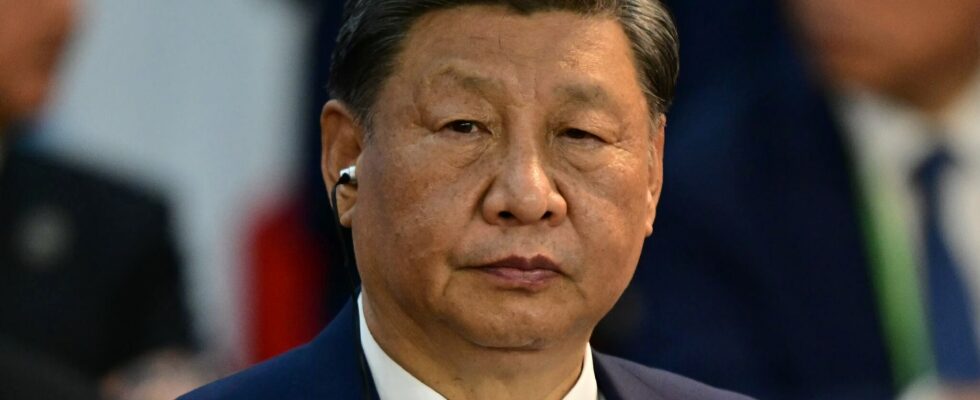In China, the Year of the Snake will begin on January 29, just nine days after Donald Trump’s second inauguration. Did Xi Jinping see a sign? In any case, the Chinese president has every reason to be vigilant in the face of a political animal that gave him a hard time during his first term. The Republican leader launched a trade war against Beijing in 2018, while increasing the flattery towards his counterpart.
Trump’s return to the White House comes at a delicate time for China, in a context of slowing growth, against a backdrop of the real estate crisis, sluggish demand and the specter of deflation. Several signals testify to this bad situation: the Chinese currency continues to decline against the dollar (it fell at the beginning of January to its lowest level in 16 months), and the stock index of the 300 largest Chinese capitalizations has fallen since beginning of the year.
If Trump follows through on his threat to increase tariffs by 60% on imports of Chinese goods, the situation will become even more complicated for the world’s second-largest economy, which could lose up to 1 point of GDP this year. For many observers, Trump will go on the offensive from the start of 2025 – despite the risks of inflationary effects in the United States. But no one knows what level of taxation it will apply; nor what range of products will be affected; and no more if the final objective is to reach an agreement with Beijing.
Retaliatory measures
Faced with the clouds accumulating on the horizon, China this time will not be taken by surprise, unlike what happened in 2017. Under the leadership of Xi Jinping, the Empire of Milieu has considerably increased its efforts in recent years to increase its strategic autonomy in key technologies, such as semiconductors. And to depend less on the American market by diversifying its exports, particularly to countries in the South.
Beijing has not only put itself in battle order to resist a trade war, but also to be able to counter. “There is no doubt that China is preparing for Trump’s tariffs and will take retaliatory measures, while trying to engage in dialogue to lower the level of pressure. The question is to what extent she will succeed…”, asks Steve Tsang, director of the SOAS China institute at the University of London.
Opportunities for Beijing
The communist regime has options to fight back, starting with introducing its own customs duties. “China will threaten the United States with retaliation that will have repercussions on targets that Trump considers important: farmers and the stock market,” explains Dereck Scissors, a China specialist at the American Enterprise Institute, a think tank. Like the measures taken by the Biden administration over the past four years, China could also block certain exports of strategic components to the United States. “It controls elements of essential supply chains for key technologies, which it could threaten to disrupt,” adds William Matthews, analyst at Chatham House. Another weapon, the boycott: the Asian giant has already begun to show what it is capable of by opening an anti-monopoly investigation last month against the champion of American high-tech Nvidia, and by prohibiting its companies from obtaining supplies with him in graphics processors, according to the South China Morning Post. A direct response: the king of chips intended for artificial intelligence has been obliged since 2022 to no longer deliver its most sophisticated products to Chinese groups.
But if it risks increasing trade and geopolitical tensions between Beijing and Washington, Trump’s comeback could also create opportunities for Beijing. While the Biden administration has worked to unify its allies against China, Donald Trump has already begun to threaten and push them around, in the name of American interests. Not to mention that the 47th president has no respect for international organizations. So many spaces into which the Chinese authorities could rush to claim a more global role on the world stage, and try to influence even more UN institutions. Incidentally, this withdrawal of the United States “will provide China with greater opportunities to promote its green technologies, artificial intelligence systems and other technologies in developing countries, which means that technical standards and “Chinese products are more likely to establish themselves, thus increasing the country’s global influence,” predicts William Matthews.
The thorny question of Taiwan
In reality, Trump could facilitate China’s strategy. “Beijing anticipates that a Trump presidency will exacerbate chaos and polarization within the United States while further eroding America’s international reputation,” summarizes Tong Zhao, a researcher at the Carnegie Endowment for International Peace in Washington. to capitalize on this situation by focusing on strengthening its own power and soft power, and strengthening its ties with the international community – particularly the nations of the Global South and the United States’ Western allies – so as to isolate Washington on the stage international.”
It remains to be seen what attitude Trump will adopt towards Taiwan, the most explosive issue between the two leading world powers. It is not excluded that the Republican leader could sacrifice the island – which the communist regime wishes to bring back into its fold – by using it as a bargaining chip in a negotiation with Xi Jinping. And this, even if many voices within the American government and Congress would oppose such an arrangement, in the name of defending a democratic regime and the geopolitical interests of the United States. The situation is all the more uncertain since Elon Musk, close advisor to Trump and owner of X, SpaceX and Tesla, whose largest electric car factory is in China, did not hesitate to align himself with the Chinese positions regarding Taiwan. “Unlike his predecessors, Donald Trump does not seem deeply attached to the democratic values that traditionally distinguish the United States from China, points out analyst Tong Zhao. His position towards Beijing could be above all transactional, which could allow it to conclude controversial agreements with Beijing. Potentially at the expense of Taiwan.
.
